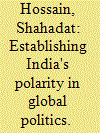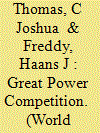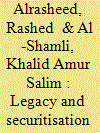|
|
|
Sort Order |
|
|
|
Items / Page
|
|
|
|
|
|
|
| Srl | Item |
| 1 |
ID:
193250


|
|
|
|
|
| Summary/Abstract |
The growth of the services sector is accompanied by the growth of the transactions relating to services. In India, after 1991, the government took several systematic measures to strengthen India’s position on global platforms. India’s trade as a percentage of GDP has increased from around 17 per cent in 1991 to 37.81 per cent in 2020 (according to World Bank). As per the data released by the World Trade Organization in 2019, India’s share in global services export stood at 3.5 per cent as against merchandise exports at 1.7 per cent (in 2018). The authors Arnob Paul and Sushanta Kumar Nayak give a brief description of the growth of India’s services trade from 2005 to 2020. For this study, the secondary data have been collected from the WTO Trade in Services database, and based on the International Monetary Fund database in the years from 2005 to 2020.
|
|
|
|
|
|
|
|
|
|
|
|
|
|
|
|
| 2 |
ID:
193246


|
|
|
|
|
| Summary/Abstract |
India’s foreign policy was historically rooted in movements like the Non-Aligned Movement (NAM), but currently, to counter China's rise in the Indo-Pacific region, India has joined a US-driven association, the Quadrilateral Security Dialogue (QUAD). India is also member of the Shanghai Cooperation Organization (SCO), which is a Eurasian bloc. Shahadat Hossain explores India's diplomatic balancing act by analysing its stance in the Ukraine-Russia conflict and its participation in the SCO and QUAD. He questions whether India merely balances or independently shapes international affairs. In balancing relationships with the SCO and QUAD, India demonstrates its diplomatic prowess and establishes a third pole, safeguarding its national interests.
|
|
|
|
|
|
|
|
|
|
|
|
|
|
|
|
| 3 |
ID:
193245


|
|
|
|
|
| Summary/Abstract |
The unequal distribution of power and resources has created conditions for conflict or even war between states. With the United States a declining hegemon and China on the rise, a conflict between these two great powers was bound to erupt. In this regard, the US government noted in the National Security Strategy of 2021 that China is a competitor and a threat to its goals and to its desire to remain the dominant power in the world. One of the factors that have brought China to the position of a challenge and competitor to the US and other powers is the Belt and Road Initiative (BRI). In this paper, C Joshua Thomas and Haans J Freddy throw some light on the great power competition in the context of BRI and examine how the US is leading the counterbalance with its Build Back Better World (B3W). The US and other liberal countries are challenging the BRI by means of the Quadrilateral Security Dialogue (QUAD) and the Free and Open Indo-Pacific (FOIP). What will be the consequences of such a great power competition and what challenges the BRI might face in the future are questions that this paper addresses
|
|
|
|
|
|
|
|
|
|
|
|
|
|
|
|
| 4 |
ID:
193249


|
|
|
|
|
| Summary/Abstract |
The Indian diaspora is one of the largest, richest, oldest, and most dynamic in the world. It surprisingly emerged as a source of India’s soft power. The Indian diaspora has shown the ability to strengthen India’s global relations and to rebuild India’s image beyond the borders. It disseminates Indian traditions and civilisation that generate the feeling of “Indianness”. Though, during the pre-liberalisation period, the diaspora had no adequate space in India’s foreign policy, after realising its worth the Government of India is now cultivating it. The Indian diaspora is raising the image of India especially in the United States of America (information technology & software skills), United Arab Emirates (culture), and Saudi Arabia (entrepreneurship or managerial assistance). However, in South Asia, the Indian diaspora is not a real factor in support of objectives of India’s foreign policy. The objective of this research paper by Kriti is to explore the significance of the Indian diaspora as India’s soft power in South Asia and its impact on India’s bilateral relations with the countries in the region.
|
|
|
|
|
|
|
|
|
|
|
|
|
|
|
|
| 5 |
ID:
193251


|
|
|
|
|
| Summary/Abstract |
After the Arab Spring took place in Syria in 2011, the relationship between the rulers and the ruled across the region became increasingly strained. In a fractious context, several opposition groups sought to overthrow the regime in Syria, as a consequence of a perceived lack of religious legitimacy. The Lebanese Hezbollah policies towards the Syrian crisis have been impacted by ideological variables, the regional balance of power, Arab community structures, and geo-strategic factors. Hassan Nasrallah, the leader of Lebanese Hezbollah has regularly delivered speeches to secure the survival of the Axis of Resistance. The main aim of this paper is to investigate the objects of threat and the legacies which were used for the securitisation in the Syrian crisis. The authors, Rashed Alrasheed and Khalid Amur Salim Al-Shamli show that legacy issues facilitate the securitisation of Israel, USA, ISIS, and Sunni groups in Syria and generate suitable circumstances to move the audience of the Axis of Resistanc.
|
|
|
|
|
|
|
|
|
|
|
|
|
|
|
|
| 6 |
ID:
193248


|
|
|
|
|
| Summary/Abstract |
Chirmi Kharay and Kavya Srivastava are putting up a study of the collaboration between China and Pakistan on nuclear technology applications in the context of US relations with Pakistan and taking into account Islamabad’s fear of India. The non-proliferation agenda of the United States was derailed by the close association between Beijing and Islamabad even though Pakistan remained an American ally throughout the Cold War period and provided essential support to the US proxy war against the Soviet Union in Afghanistan. The authors show that the evolving strategic equation between the USA, the USSR, and the People's Republic of China facilitated Pakistan's development of atomic weapons and allowed it to proliferate them in various countries despite half-hearted Western attempts to sanction the country.
|
|
|
|
|
|
|
|
|
|
|
|
|
|
|
|
| 7 |
ID:
193252


|
|
|
|
|
| Summary/Abstract |
Côme Carpentier De Gourdon reflects on the profound and momentous changes taking place in many areas of knowledge and on the need to adopt educational methods and materials to this rapid evolution in the sciences and techniques, while honouring and restoring the valid traditions and indigenous cultures of learning of ancient civilisations. The author provides an overview of the proposed National Education Policy being mooted by the government of India.
|
|
|
|
|
|
|
|
|
|
|
|
|
|
|
|
| 8 |
ID:
193247


|
|
|
|
|
| Summary/Abstract |
The US complaints about China’s unfair trade practices remained unresolved for a very long time. Using techno-industrial policies, China was observed to have moved permanently away from market-based principles. Even then, as the US and Chinese economies are highly interdependent, a trade war between the two countries appeared unthinkable. When President Trump launched a trade war against China, a number of causal explanations were provided using systemic level factors. However, systemic analysis was not sufficient to understand why the trade war happened under President Trump. Also, the reason why trade was chosen as a weapon was not explicitly given. In order to provide clearer answers, the author, Ragul P in this article identifies a number of causal factors behind the US trade war against China.
|
|
|
|
|
|
|
|
|
|
|
|
|
|
|
|
| 9 |
ID:
193253


|
|
|
|
|
| Summary/Abstract |
The child-witch phenomenon in Nigeria is a devastating menace that is ravaging families in the Akwa-Ibom and Cross River states of the Southern Region of Nigeria. This phenomenon is a creation of religious frauds like witch-doctors, Alfas, priests, prophets and prophetesses who claim that they have the power to know who is a witch or wizard. This has led to over 200,000 children between the ages of 5 and 17, being thrown out on to the streets. Women also suffer a similar fate in the hands of their husbands, in-laws and children. The situation had become so dreadful that the Governor of Akwa-Ibom State passed a Child Rights Law, which prohibits stigmatising any child, as a witch, or killing or maiming any child, in addition to the existing provisions of the Criminal and Penal Codes. Emmanuel A Adesina, Adeola Omotunde and Olufemi Abifarin, examine critically this category of criminal behaviour and offer a pragmatic solution to the problem.
|
|
|
|
|
|
|
|
|
|
|
|
|
|
|
|
|
|
|
|
|